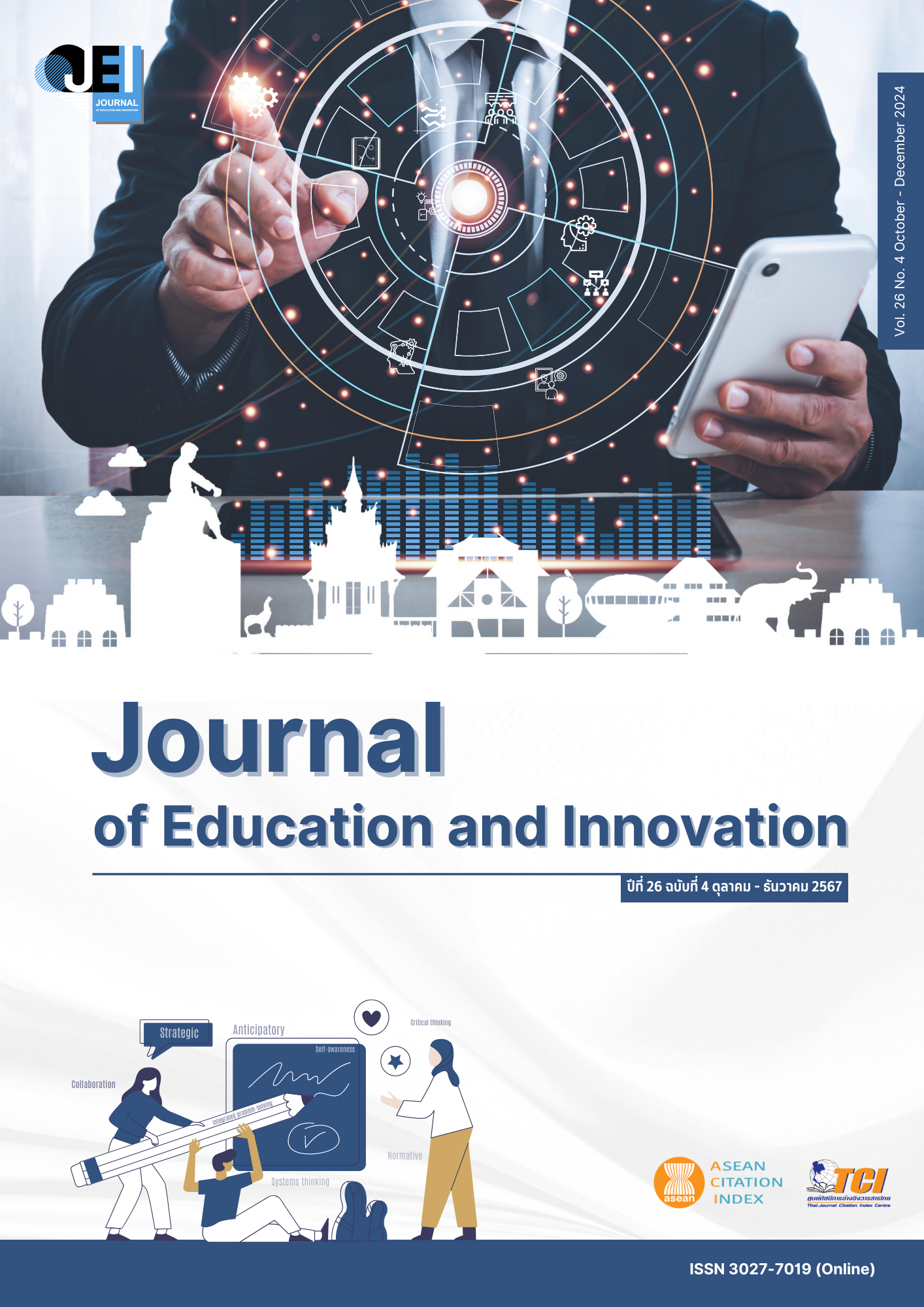THE CURRICULUM DEVELOPMENT INNOVATION OF SECONDARY SCHOOLS BASED ON THE CONCEPT OF FINANCIAL LITERACY
Main Article Content
Abstract
The objectives of this research were 1) to study the modified priority needs index of secondary school curriculum development based on the concept of financial literacy; 2) to study the good practices of secondary school curriculum development based on the concept of financial literacy; and 3) to design the curriculum development innovation of secondary school based on the concept of financial literacy. The sample consisted of 331 secondary schools. The informants were 662 school administrators, and heads of academic administration groups, and 31 experts for a total of 693 people. The research instruments were questionnaires, interviews, and actual state and desirable state assessment forms. Data were analyzed using average, standard deviation, Modified Priority Needs Index (PNImodified), and content analysis. The research revealed that:
1. The greatest need for developing a secondary school curriculum based on the concept of financial literacy is setting the objectives of the school curriculum that emphasize learning outcomes as the basis. (PNImodified = 0.156)
2. Good practices for developing secondary school curricula based on the concept of financial literacy consist of four main approaches: 1) Setting the objectives of school curricula that emphasize learning outcomes as the base. (Outcome-based Curriculum) 2) determining the learning content in the school curriculum, including basic subjects, additional courses, and free elective courses, through the integration of financial education content that is appropriate according to age; 3) determining learning activities in the school curriculum that are consistent with the level of financial experience of the learners; and 4) evaluating the results of the curriculum in the school curriculum by using collaborative assessment.
3. The curriculum development innovation based on the concept of financial literacy was an innovation in designing school curriculum to create financially smart learners. It consists of vision, principles, aims, indicators, results of curriculum, the curriculum development process, and guidelines for implementing the curriculum.
Article Details

This work is licensed under a Creative Commons Attribution-NonCommercial-NoDerivatives 4.0 International License.
The owner of the article does not copy or violate any of its copyright. If any copyright infringement occurs or prosecution, in any case, the Editorial Board is not involved in all the rights to the owner of the article to be performed.
References
Asawapoom, A. (2008). Modern education management: concepts, theory, and practice. Ubon Ratchathani: Ubonkit Offset Press.
Bank of Thailand. (2017). Report on the results of the Thai Financial Skills Survey 2016. Bangkok: Bank of Thailand.
Bank of Thailand. (2021). Report on the results of the Thai Financial Skills Survey 2013. Bangkok: Bank of Thailand.
Chaowachote, S., & Kessadayurat, C. (2016). Managing Relationship in a Nursery School. Journal of Business, Economics and Communications, 11(1), 69-82.
Chatarat, P. (2022). Best Practices (Best Practice) Continuous Curriculum Development Linking Basic Education with Vocational and Higher Education. Songkhla: Thachin Udomwittaya School.
Financial Service Authority. (2005). Measuring Financial Capability: an exploratory study. London: The Financial Service Authority.
Inlakorn, S. (2020). An Analysis of Financial Literacy of the Students at Kasetsart University Sri Racha Campus. Interdisciplinary Sripatum Chonburi Journal, 6(2), 78-90.
Kaewurai, W. (2023). Curriculum development: from theory to practice. Phitsanulok: Naresuan University.
Luhrmann, M., (2015). The Impact of financial Education on Adolescents’ Intertemporal Choices. American Economic Journal: Economic Policy, 10(3), 309-320.
Lyons, C. A., (2015). Translating Financial Education into Behavior Change for Low-Income Populations. Association for Financial Counseling and Planning Education, 17(2), 27-45.
National Statistical Office Thailand. (2021). Summary of important results Survey of household economic and social conditions 2021. Bangkok: National Statistical Office, Ministry of Digital Economy and Society.
Organisation for Economic Co-operation and Development. (2009). Financial Literacy and Consumer Protection: Overlooked Aspects of the Crisis. Paris: OECD Publishing.
Organisation for Economic Co-operation and Development. (2020). OECD/INFE 2020 International Survey of Adult Financial Literacy. Paris: OECD Publishing.
Phatphon, M. (2019). Main concepts of curriculum development. Bangkok: Curriculum and Learning Innovation Leadership Center.
Pungbangkradee, S., Chaemchoy, S., & Siribanpitak, P. (2022). Curriculum development innovation of primary school based on the concept of collaborative evaluation and stem education goals. Journal of Education Naresuan University, 24(2), 85-95.
Sakondhawat, K. (2019). Development of economic learning activity package sing scenario-based learning to promote financial literacy of lower secondary school students (Master thesis). Bangkok: Chulalongkorn University.


